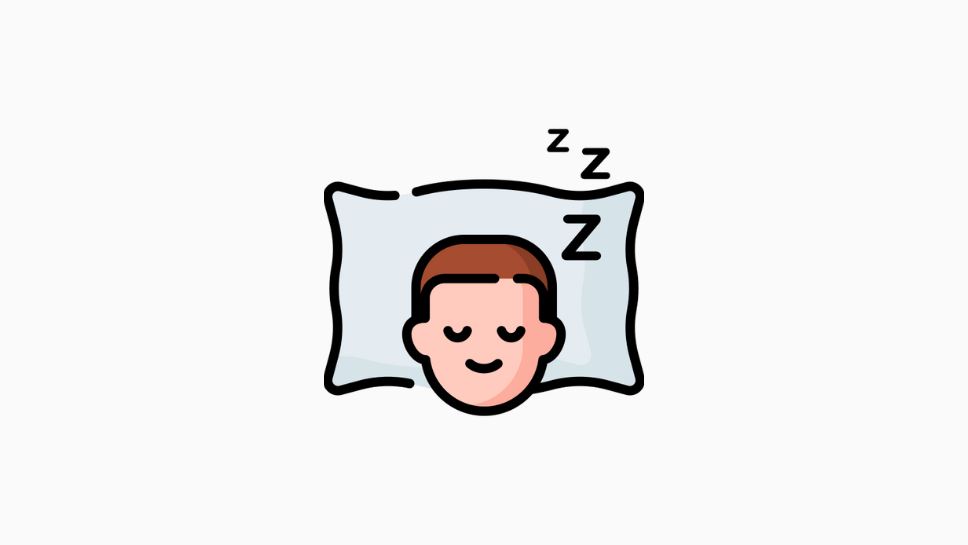Table of Contents
The average person will spend 36 percent of their life asleep.
This sounds like a lot. But, most of us get insufficient and poor quality sleep almost every night, which can cause serious negative impacts on our physical health, mental well-being, and overall quality of life.
Chronic sleep deprivation has been linked to an increased risk of various health issues, including obesity, diabetes, cardiovascular diseases, and weakened immune function. Plus, it can impair cognitive functions such as memory, concentration, and decision-making abilities.
In other words, sleep is a critical part of our mental and physical performance.
In fact, almost every part of our life can be improved by understanding and optimising our sleeping habits.
😴 Why We Sleep
There are three key mental and physical benefits of sleeping:
1 – Restoration
During the day our brain uses a bunch of energy and nutrients to support its intricate network of neurons, resulting in the build-up of metabolic waste (a natural byproduct of its functioning). Now, while this is completely normal, too much of this waste build-up has been linked to neurological issues like Alzheimer’s disease.
Luckily, sleep plays a critical rule in cleaning out this waste every night.
Essentially, our brain has a cleaning system called the glymphatic system. When we’re asleep, our brain cells shrink by about 60 percent, creating extra space between them. The glymphatic system then takes advantage of this increased space to work like a cleaning crew.
This nightly brain cleaning process is crucial because it helps maintain the brain’s health and ensures it functions optimally. When we wake up in the morning, our brain is refreshed and ready for a new day of learning and thinking.
2 – Memory consolidation
At night, our brain stores and strengthens memories to make them more permanent. During this process, new information and experiences are transferred from short-term memory to long-term memory.
But, when we sleep insufficently or poorly, our brain won’t be able to take advantage of the processes needed to organise, strengthen, and solidify the memories we’ve formed during the day.
3 – Metabolic health
Our brain plays a significant role in improving metabolic functions when we sleep.
For exmple, sleep helps to maintain hormones like insulin (which controls blood sugar levels) at optimal levels, helps our body repair tissues (including muscles and organs), and helps reduce stress (by lowering cortisol levels).
Studies have also shown that insufficient sleep can result in fat gain and muscle loss – this is because our body increases the amount of energy it burns from carbohydrates and proteins, instead of from fat.
💤 How Sleep Works
In 1982, Dr Alexander Borbely wrote a paper in the journal ‘Human Neurobiology’ about something he called the ‘2-process model of sleep regulation’.
Basically, this model explains how our sleep and wake states are controlled by two processes that work together at the same time.
Process 1: Sleep Pressure
Throughout the day, sleep pressure (our desire to sleep) increases. This is driven by a chemical called adenosine.
So, when our adenosine levels are at their highest (typically at night), sleep naturally happens.
But, when we wake up in the morning, our adenosine levels are depeleted and our desire to sleep is reduced too (i.e. the sleep pressure has decreased).
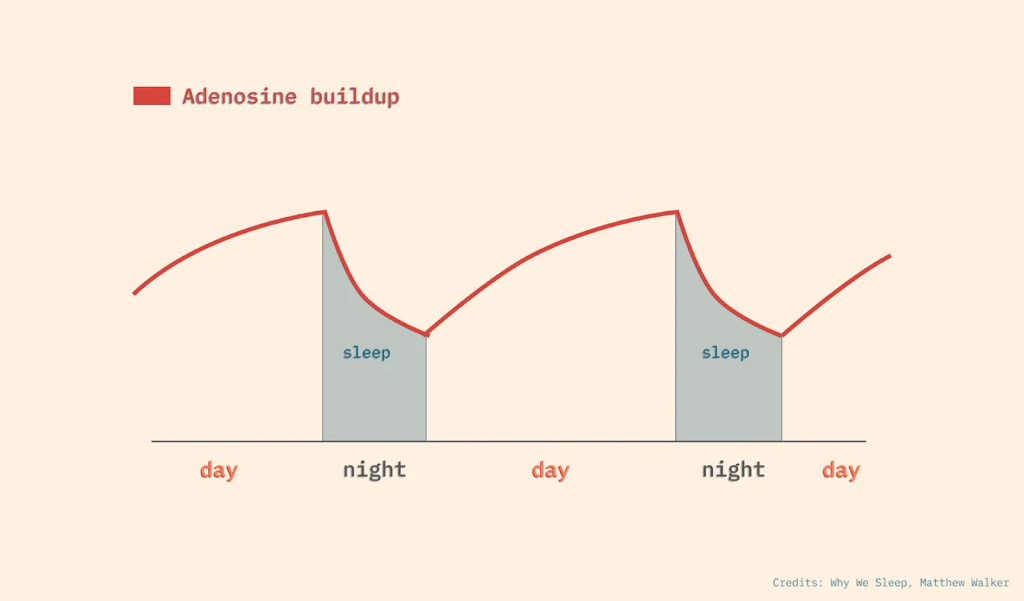
Process 2: Wake Drive
There is a 24 hour body clock located deep in our brain that creates a cycling day-night rhythm (the circadian rhythm) that makes us feel tired or alert at regular times of night and day, respectively.
This biological clock in our brain is called the suprachiasmatic nucleus.
Basically, the suprachiasmatic nucleus can ‘sample’ the light being sent from each eye along the optic nerves as they head towards the back of the brain for visual processing. If there’s very little light, then the suprachiasmatic nucleus will produce melatonin, causing us to feel drowsy. And if there’s a lot of light, then this won’t happen.
One intriguing observation is that circadian rhythms differ from person to person.
Some individuals experience their highest alertness early in the day and feel most sleepy early in the evening, making them “morning people.” On the other hand, there are “night owls” who prefer waking and being active later in the day, with their peak alertness happening during the evening.
Interestingly, whether you lean towards being a morning person or a night person (your chronotype) is heavily influenced by genetics. It’s not something that’s easily changed either, as it appears to be deeply ingrained in our biological makeup.
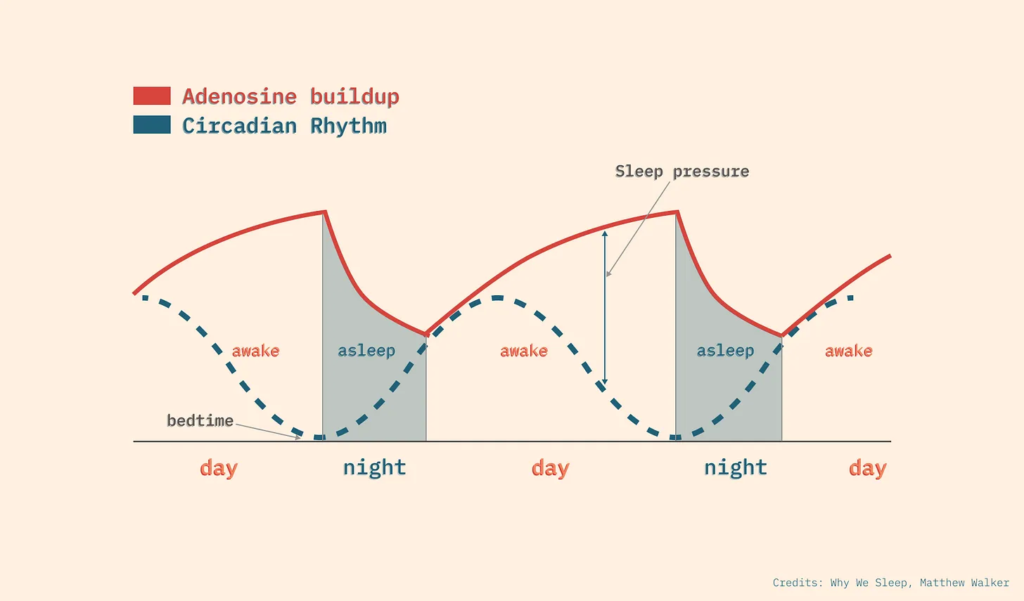
⭕ The Sleep Cycle
The quality of our sleep is largely determined by a process called the sleep cycle.
In particular, there are two important parts of the sleep cycle:
- NREM sleep (this is deep sleep, called non-Rapid Eye Movement sleep)
- REM sleep (this is more active sleep, called Rapid Eye Movement sleep)
NREM Sleep
During NREM sleep, our bodies relax and rejuvenate.
Our breathing slows, blood pressure drops, and our brains become less receptive to external stimuli, making us harder to awaken.
In this phase, the body carries out critical repair and growth processes, such as releasing growth hormones for tissue growth and muscle repair.
As a result, NREM sleep is especially important for athletes or anyone who places high physical demands on their body. For example, one study showed that when basketball players slept for at least ten hours a night, their performance significantly improved, showcasing the importance of this stage in physical recovery.
REM Sleep
REM sleep serves as a mental rejuvenation phase.
In contrast to NREM sleep, during his part of the sleep cycle our brains become active, engaging in processes such as dreaming and reorganising information.
The brain during this phase clears out irrelevant information, strengthens memory, facilitates learning, and promotes neural growth.
The Cycle
Throughout the night, we cycle between NREM and REM sleep roughly every 90 minutes.
But, the ratio of NREM to REM sleep within each cycle varies: in the first half of the night, we primarily experience deep NREM sleep, with very little REM sleep. But, towards the end of the night, we shift to far more REM sleep, before eventually waking up.
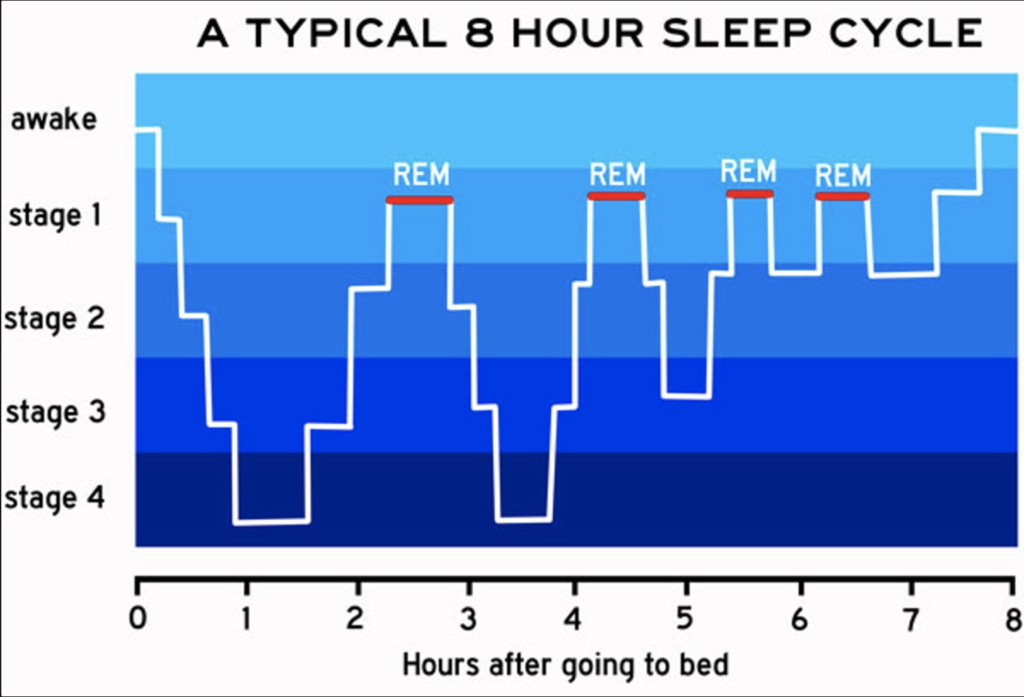
The rhythm of our sleep cycle — the back-and-forth dance between NREM and REM sleep throughout the night — is key to good quality sleep.
Disruptions in this rhythm, or the timing of these phases, can lead to sleep disorders and other health issues.
Luckily, there are a few things we can do to maintain a consistent sleep cycle and improve our overall quality of sleep…
🛏️ How to Sleep Better: the REM Factors
Routine
The best way to maintian a consistent sleep cycle is to develop a sleep schedule. This means sleeping and waking at roughly the same time every night.
You see, as creatures of habit, we thrive on consistency.
When we have irregular sleep schedules, this throws off our circadian rhythm, leading to disturbed sleep that may affect our mood, energy levels, productivity and overall health.
This means avoiding the temptation to sleep in on weekends too. While this may feel good in the moment, it will hind our ability to get good quality sleep in the long-run.
When to Sleep
The exact time to go to sleep won’t be the same for everyone.
As mentioned above, we all have slightly different chronotypes and this will influence when we feel tired. The important thing to understand is our body’e natural inclination and work with that rather than against it. Paying close attention to our body’s signals can help us to determine when it’s best for us to go to bed.
But, having said that, there is some research that suggests the timing of our sleep is significant.
One study showed that we get the most beneficial hormonal secretion and recovery by sleeping during the hours of 10pm and 2am. It said that sleeping during these hours can provide the most rejuvenating effects, as our bpdies undergo essential repair and detoxification.
If your chronotype makes it difficult for you to sleep during these hours, don’t worry. The important thing is to 1) be consistent with your routine and 2) to sleep enough hours.
Sleep Duration
An experiment by the University of Pennsylvania gathered 48 mean and women who averaged around 7-8 hours of sleep per night. They then split them into four groups:
- Group 1 had to stay up for 3 days straight without sleeping.
- Group 2 had to sleep for 4 hours per night for 2 weeks.
- Group 3 had to sleep for 6 hours per night for 2 weeks.
- Group 4 had to sleep for 8 hours per night for 2 weeks.
The idea was to test their mental and physical performance throughout the duration of the experiment.
Here’s what they found: Group 4 experienced no cognitive or physical decline. Groups 2 and 3 experienced substantial decreases in cognitive/physical performance. And Group 4 had very significant decreases in overall health and performance.
In particular, there were 2 key findings from the experiment:
- Sleep debt is cumulative – it’s like an overdraft on a bank account that keeps growing. After a week, 25% of the 6 hour per night sleepers start nodding off at random times throughout the day. After 2 weeks, their mental and physical performance was as poor as if they’d been awake for two days straight.
- Participants didn’t notice their performance decline – when scoring their own mental and physical performance across the experiement, they thought their performance levels initially declined before tapering off. But, in reality, their performance levels were declining consintently every day of the experiment.
The irony here is that most us suffer from sleep deprivation so we can work more, but the drop in performance ruins any potential benefits of working additional hours.
In the US alone, studies have estimated that sleep deprivation is costing businesses over $100 billion each year in lost efficiency and performance. And the World Health Organisation (WHO) has now decalred a sleep loss epidemic throughout industrialised nations.
So, what is the correct amount of sleep?
According to a wide range of studies, experts agree that 95 percent of adults need to sleep 7 to 9 hours each night to function optimally. Most adults should probably be aiming for eight hours per night, while children, teenagers, and older adults typically need even more.
Power Down
In our hyper-connected world, we’re often glued to our screens, be it for work or pleasure. But, these screens emit light that can mess up our sleep.
In short, these screens interfere with the production of melatonin, a crucial hormone that acts like a conductor for our biological sleep orchestra, regulating our sleep-wake cycle. So, staring at screens before bed is akin to having a rowdy audience member disrupting the performance (more on this below).
This is why it’s so important to have a ‘power down’ routine.
The idea is that we want to create a buffer between our day-to-day activities and our sleep. It’s a clear boundary that work’s over and it’s time to rest.
For example, before bed you could read a book, do some gentle yoga, meditate, or even indulge in a self-care routine like a warm bath.
Wake Up
The final part of a good sleep routine is what happens when we wake up.
Many of us rely on an alarm to wake us up in the morning. But, the problem is that the alarm is most likely to ring in the middle of one of our sleep cycles. This makes us feel groggy and our cortisol levels spike (i.e. we feel stressed).
So, the trick is to tune our alarm to our ~90 minute sleep cycles. For example, if we go to bed at 10pm, try setting the alarm for 5:30am for a total of 7.5 hours sleep, which neatly fits into 5 full sleep cycles.
Or, even better, don’t set an alarm at all. Waking up naturally – when our brain and body finishes their cycles – is the most gentle and restorative way to start the day. In fact, studies have shown that people who wake up naturally tend to feel more rested, more positive, and even make healthier choices throughout the day.
Environment
The next most important factor to improve our quality of sleep is to fine tune our environment.
In particular, we need to think about light and temperature.
Light
One of the key factors in maintaining a healthy circadian rhythm is exposure to natural sunlight early in the morning and bright light throughout the day. In particular, it’s recommended that peole get at least 20-30 minutes of exposure to the sun as soon as possible after waking up.
This light exposure helps to reinforce our body’s internal clock, leading to several benefits, including improved daytime energy levels and improved sleep quality at night.
Research has shown a bunch of positive effects of light exposure on sleep patterns, particularly for people dealing with insomnia or sleep disturbance. In one study, for example, people with insomnia who were exposed to bright light during the day experienced signigicant improvements in both the quality and duration of their sleep. The time it took for them to fall asleep was reduced by an impressive 83%.
It’s worth mentioning that most of the research here has been done on people with sleep issues, but there’s still plenty of evidence that it’s a good thing for pretty much everyone to get sunlight during the day for better sleep.
The mechanism behind this lies in the way light affects the suprachiasmatic nucleus, mentioned previously. As the sun sets and darkness falls, the pineal gland is prompted to release melatonin, a hormone that induces sleep.
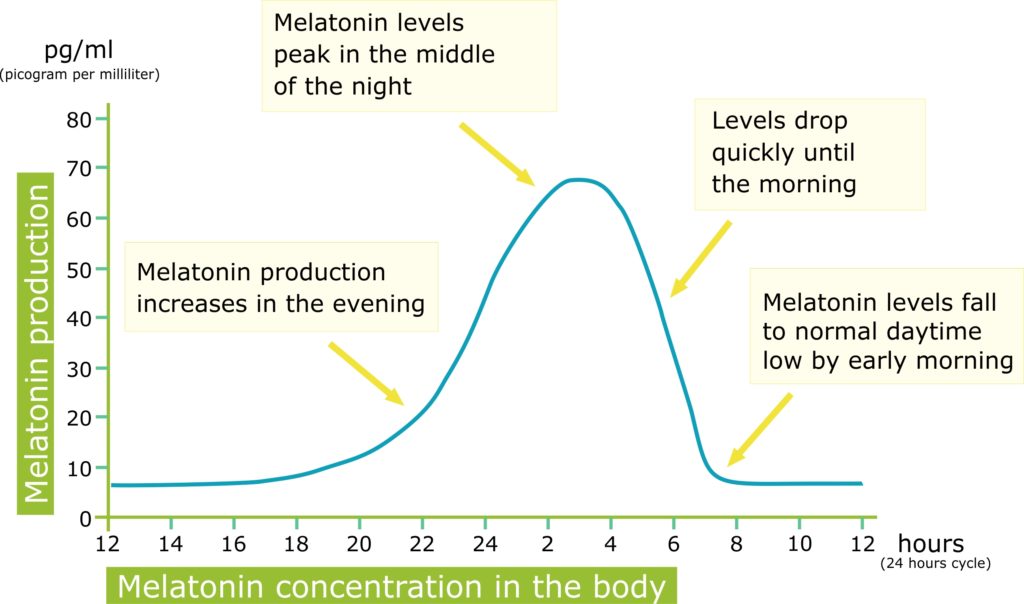
But, artificial lights can disrupt this natural process, affecting our ability to fall asleep and stay asleep. This is why it’s a good idea to avoid screens and blue light exposure before bed.
In one study sponsored by mobile phone companies found that using a phone before bed caused paritcipants to take longer to reach critical deep stages of sleep and they spent less time in deep sleep. This translates to a diminished ability for the body to heal, depressed immune function, depressed hormone function, and poorer performance the following day.
So, if possible, we should try to turn off all our devices at least 90 minutes before bedtime. Or, if screens are necessary, invest in some blue-light blocking glasses (as blue-light is the biggest culprit when it comes to inhibiting melatonin production).
Then, when you eventually go to sleep, black out the room.
Studies show that exposure to even small amounts of light during usual hours of sleep suppresses melatonin levels by more than 50 percent, which further disrupts our sleep.
Temperature
Our body’s internal temperature regulation (thermoregulation) also plays a significant role in the quality and duration of our sleep.
When it’s time for our body to rest, our core body temperature naturally decreases to help initiate sleep. This drop in temperature is a signal to our brain that it’s time to wind down and prepare for sleep.
Historically, this process was in sync with the rise and fall of temperatures over the course of a day and night, which our bodies used (along with light) to set our circadian rhythms.
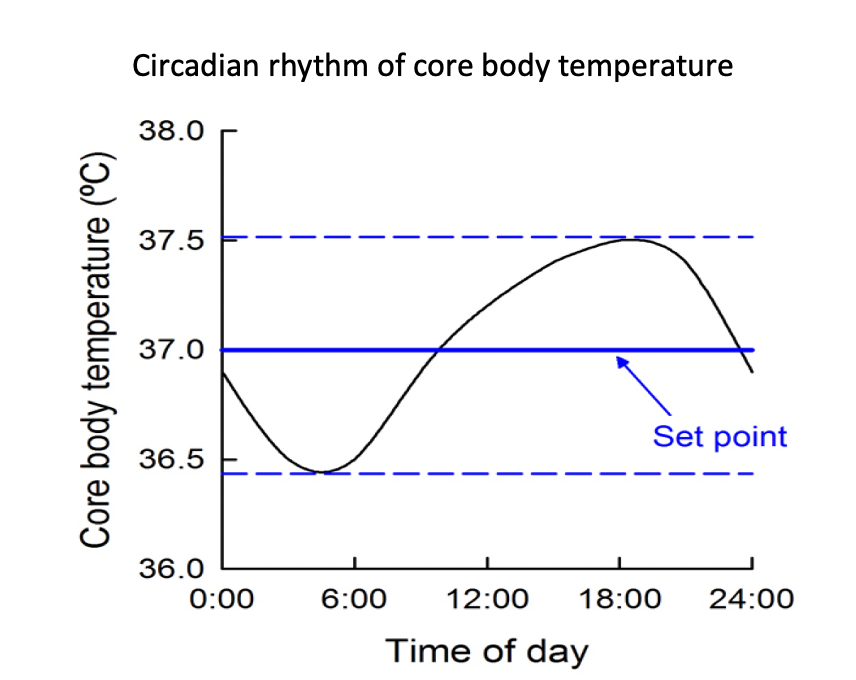
But, modern living has chnaged this dynamic. The use of thermostats, pyjamas, and blankets has standardised our temperatures, disrupting these natural temperature fluctuations and potnetially confusing our circadian rhythm.
To combat this we want to manipulate our body temperature to improve sleep. In particular, this means reducing the temperature of our bedroom when it’s time for bed, to align with the natural temperature drop we’d expect in a healthy circadian rhythm of our core body temperature.
For example, we could take a hot bath before bed. While this may sound counterintuitive, the rapid cool-down period after getting out of the bath can induce feelings of sleepiness and help us relax. Or we can splash water on our skin, open a window, and wear less clothes.
If you don’t believe me, research also supports the link between cooler temperatures and better sleep.
Studies suggest that the optimal room temperature for sleep is quite cool, around 60 to 68 degrees Fahrenheit (15 to 20 degrees Celsius). And other resesrch has found that bedroom temperature can affect sleep quality more than external noise, and that increased body and bedroom temperature can decrease sleep quality and increase wakefulness (e.g. people with insomnia often have a warmer core body temperature before bed, which could contribute to their sleep difficulties).
Meals
Meals (or, perhaps more accurately, nutrition) is the other major factor that influences the way we sleep.
Dinner
The timing, size, and content of our meals can significantly affect our sleep quality.
Eating late at night can disrupt both the quality of our sleep and the release of certain hormones associated with sleep and overall health, such as Human Growth Hormone (HGH) and melatonin. These hormones play a vital role in our body’s sleep-wake cycle and repair processes.
Large meals or beverages consumed close to bedtime can cause problems such as indigestion, which may interfere with our ability to fall asleep. Plus, drinking excessive fluids can lead to frequent urination, causing disruptions to our sleep by making us wake up during the night.
But, not all late-night eating is problematic.
In fact, the type and quality of our late-night snack can significantly impact our sleep. A light snack is generally okay and might even help us sleep better, depending on its composition.
For example, one study found that eating a high-carbohydrate meal around four hours before bedtime can help individuals fall asleep faster. This may be due to the impact of carbohydrates on the production of serotonin, a brain chemical that promotes feelings of relaxation and sleepiness.
Caffeine
Caffeine – found in beverages like coffee, cola, certain teas, and chocolate – can also significantly affect sleep.
Caffine works by blocking the action of adenosine (the brain chemical that builds up throughout the day and makes us feel tired). This makes us feel super awake and the effects can linger for up to 8-10 hours after consumption. So, if we’re consuming caffeine in the afternoon or evening, it can make it harder to fall asleep at night.
One study on the impact of caffeine on sleep found that caffeine consumed up to six hours before bedtime can lead to a loss of about one hour of sleep – an effect often not consciously recognised by the person sleeping.
This is why it’s so important to adopt a ‘caffeine curfew. The idea is that we should stop consuming caffeine around 2pm or 3pm if we don’t want it to negatively impact out sleep.
Alcohol
Alcohol is often mistakenly believed to aid sleep due to its sedative effects.
While it may help people fall asleep faster, it ultimately disrupts the quality of sleep.
In fact alcohol has several adverse impacts on sleep and associated hormonal regulation:
- Disrupts REM Sleep: REM sleep which is critical for memory consolidation and learning, is significantly affected by alcohol. Alcohol in your system can keep you in the lighter stages of sleep and prevent you from falling into deeper, more restorative levels of sleep.
- Interrupts Sleep Patterns: Consuming alcohol can lead to fragmented sleep, causing you to wake up frequently throughout the night..
- Interferes with Breathing: Heavy alcohol consumption can exacerbate symptoms of sleep apnea and contribute to snoring, which further disrupts sleep quality. Sleep apnea, a condition characterized by periodic cessation of breathing during sleep, can significantly impair sleep quality and overall health.
- Alters Melatonin Production: Alcohol can alter nighttime melatonin production, disrupting your body’s internal biological clock and affecting sleep quality.
- Affects Growth Hormone Production: A study found that alcohol consumption at night decreased the natural nighttime elevations in human growth hormone (HGH). HGH not only plays a role in your circadian rhythm but also has numerous other functions, including cell repair, metabolism, and growth.
- Interferes with Memory Consolidation: Alcohol disrupts the normal processes of learning and memory consolidation during REM sleep. In one experiment, subjects exposed to alcohol showed a significant decrease in memory recall compared to the abstinent group. The impact of alcohol on memory could be observed even for memories formed days prior to alcohol consumption.
Supplements
The final consideration – once all of the above has been addressed – is the use of supplements to assist sleep.
While the following supplements can potentially enhance sleep, it’s crucial to remember they’re not a cure-all for sleep issues. They should be used in conjunction with other natural sleep strategies and only one supplement should be tried at a time to accurately gauge its effect:
- Melatonin: Studies have shown that taking 2 mg of melatonin before bed can improve sleep quality and provide more energy the next day. It can also help reduce the time it takes to fall asleep. Notably, melatonin doesn’t lead to withdrawal effects and can be particularly helpful when adjusting to a new time zone. The typical recommendation is to take 1-5 mg of melatonin 30-60 minutes before bedtime.
- Magnesium: Magnesium is a vital mineral involved in over 600 reactions within the body. It aids in the regulation of the nervous system, relieving stress, relaxing muscles, and promoting healthy blood pressure and blood sugar levels. An adequate magnesium level can reduce the body’s stress load and improve sleep quality. A good place to start is to befin including more magnesium-rich foods in your diet (like green leafy vegetables, seeds, and certain superfoods).
- Other Supplements: There are also a variety of other supplements that can promote sleep and relaxation:
- Ginkgo Biloba: A natural herb, ginkgo biloba may aid sleep, relaxation, and stress reduction. The usual recommendation is to take 250 mg 30-60 minutes before bed.
- Glycine: This amino acid can improve sleep quality. A few studies recommend a dosage of 3 grams of glycine.
- Valerian Root: Several studies suggest that valerian can help you fall asleep and improve sleep quality. A dose of 500 mg before bed is typically recommended.
- L-Theanine: This amino acid can improve relaxation and sleep. The usual dosage is 100-200 mg before bed.
- Lavender: Known for its calming properties, lavender can improve sleep quality. An intake of 80-160 mg containing 25-46% linalool is usually recommended.

